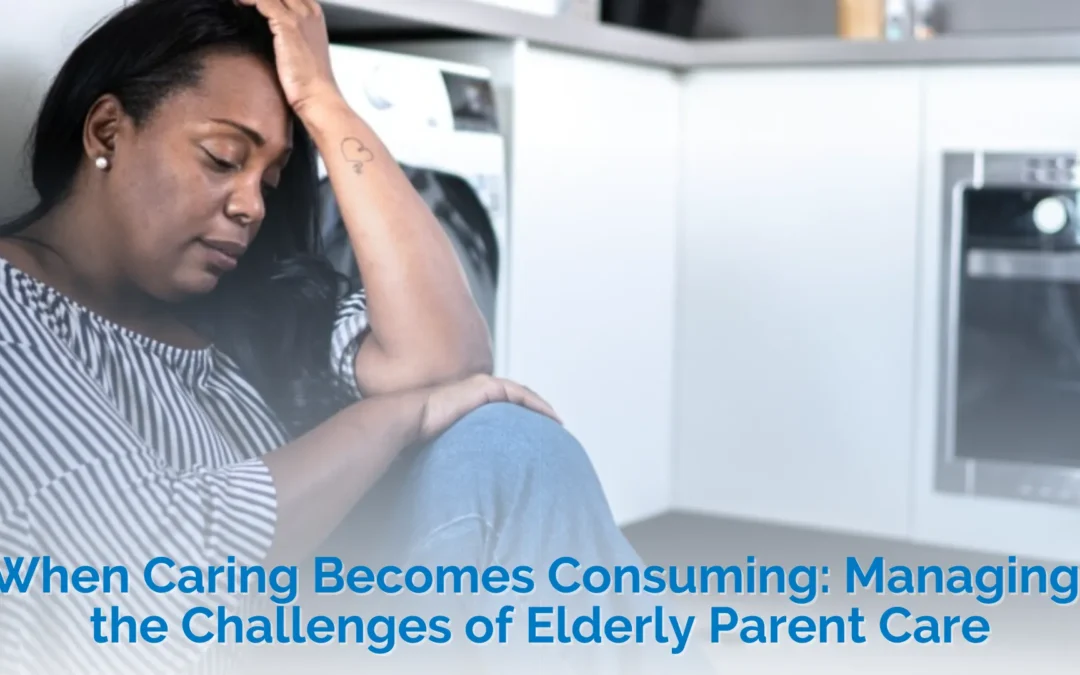Mothers dedicate their lives to looking after their children through every stage of life, so it feels like a profound act of love and devotion to return that care as they age. As life expectancy increases, more adults find themselves responsible for the well-being of their aging parents.
However, the demands of caregiving can sometimes feel overwhelming, leading many to find themselves saying, “My elderly mother is consuming my life.” Juggling the needs of elderly parent care is no easy task, and it is crucial to address these challenges to ensure both the caregiver and the elderly parent maintain their health and well-being.
In this article, we will explore the various challenges of elderly parent care and offer practical strategies for managing these difficulties.
Understanding the Challenges of Elderly Parent Care
Factors contributing to the feeling of being consumed by caregiving
First, let us start by acknowledging the emotional and physical strain involved in looking after elderly parents. The constant worry and concern for their well-being and the physical demands of assisting with daily activities can leave even the most dedicated caregiver feeling drained and overwhelmed.
Then there is the time commitment—a factor that often leads to role strain. Balancing caregiving with work, household responsibilities, and personal time becomes a juggling act. The sense that ‘my elderly mother is consuming my life’ can intensify as personal time dwindles, making it feel impossible to escape the caregiving role, leaving the caregiver with feelings of guilt, resentment, and burnout.
Not to forget, caregiving can also strain financial resources. Medical expenses, modifications to living spaces, and potentially reducing work hours to accommodate caregiving duties all add financial pressure. This financial strain often exacerbates that feeling of ‘my elderly mother is consuming my life,’ as economic security becomes another source of stress.
Lastly, the demands of caregiving can significantly impact personal relationships and social life. Time once spent with friends, pursuing hobbies, or relaxing is now devoted to caregiving. You can feel isolated, struggling to maintain connections with friends and participate in activities you once enjoyed.
Signs Your Caregiving Role is Overwhelming
Identifying common signs of caregiver burnout

Constant fatigue and lack of energy are two major red flags that the caregiving role is becoming too much. If you often feel tired even after sleeping enough, it might be a signal of physical and mental exhaustion from feeling ‘my elderly mother is consuming my life.’ In simple words, you need a break.
Another telltale sign is feeling isolated and withdrawn from social circles and activities. When you neglect your needs and social connections, it is easy to become detached and unable to maintain meaningful relationships outside your caregiving role.
Increased irritability and mood swings can also indicate that the demands of caregiving are taking a toll. The constant strain and pressure can lead to heightened stress levels, resulting in emotional outbursts and difficulty managing emotions effectively. You may get frustrated more easily or experience sudden shifts in mood that are out of character.
The last sign is consistently neglecting your health and well-being. Skipping meals, ignoring exercise routines, and forgetting medical appointments due to the demands of your caregiving responsibilities is a surefire path to caregiver burnout.
The Impact of Caregiver Burnout on You and Your Loved One
Neglecting self-care and allowing caregiver burnout to set in can have severe consequences for both you and your elderly mother. Without proper self-care, your health and well-being will inevitably deteriorate. When you reach a point where you can no longer effectively manage the demands of the caregiving role, the quality of care provided to your loved one is also bound to suffer.
Heightened and constant stress that comes with caregiving releases stress hormones that can disrupt almost all the body’s processes. This stress can contribute to physical and mental health problems, including depression, anxiety, high blood pressure, and heart disease. Additionally, prolonged stress can exacerbate conditions like diabetes, obesity, and gastrointestinal disorders, further compounding the health risks faced by you as a caregiver.
All those constant exhaustion and stress breed irritability, mood swings, and heightened emotions. These emotional outbursts will eventually push loved ones away, worsening loneliness. The more isolated and emotional you become, the more exhausted you get. Before long, you will be feeling trapped caring for your elderly parent. This vicious cycle of fatigue, isolation, and emotional ups and downs makes burnout harder to overcome.
Strategies for Managing the Challenges
When you start to feel like ‘my elderly mother is consuming my life,’ that is your cue to take a step back and prioritize self-care. Setting aside a ‘me time’ is crucial. For example, you might schedule a regular yoga class, enjoy a leisurely walk in the park, read a book, or take a long bath. Whether a few minutes a day or a couple of hours a week, ensuring you have some time to unwind and recharge can ease stress and prevent burnout.
Developing stress management techniques and incorporating relaxation techniques into your daily life can also help reduce the effects of caregiver burnout. Practices like deep breathing exercises, meditation, or yoga can provide a necessary break from the demands of caregiving and help you recharge.
Last but not least, it is crucial to realize when you need help and ask for it from an in-home respite care service. These services provide temporary relief by having a professional caregiver step in and care for your elderly parent, giving you time to rest and recharge. This professional help can help alleviate the feeling that ‘my elderly mother is consuming my life,’ ensuring you maintain your well-being while continuing to provide quality care.
Seeking Support and Resources

Utilizing In-Home Care Services
Professional in-home care providers, such as Sunny Days, offer various services designed to fulfill the needs of elderly parents while allowing you to share some of the caregiving duties and alleviate some of the burden. With customized care plans and services ranging from companionship and meal preparation to personal care and bed transfer, you can find the right level of support to ensure your loved one’s needs are met while preserving their independence and dignity.
Communicating and Delegating Responsibilities
Open communication with family members and friends is key when navigating the challenges of elderly parent care. Be realistic about what you can and cannot do, and do not be afraid to say no or ask for help when necessary. Delegate tasks and responsibilities to other family members or caregivers to alleviate some of the pressure and prevent feelings of ‘my elderly mother is consuming my life.’
End Note
Caring for an elderly parent is no easy feat, and feeling like ‘my elderly mother is consuming my life’ is a common struggle. But it does not have to be your reality. By acknowledging the difficulties, prioritizing self-care, and seeking support and resources, you can find that elusive balance and provide the best care for your loved one.
Remember, you are not alone in this journey. By taking proactive steps to manage the challenges of elderly parent care and reaching out to Sunny Days In-Home Care, you can ensure that both you and your elderly parent receive the care and attention you deserve.


